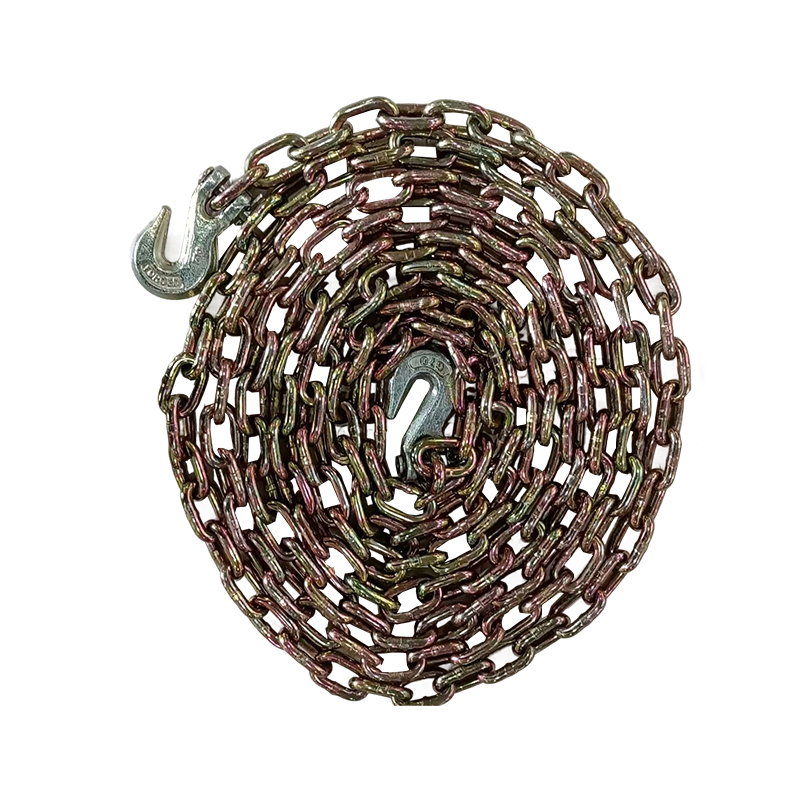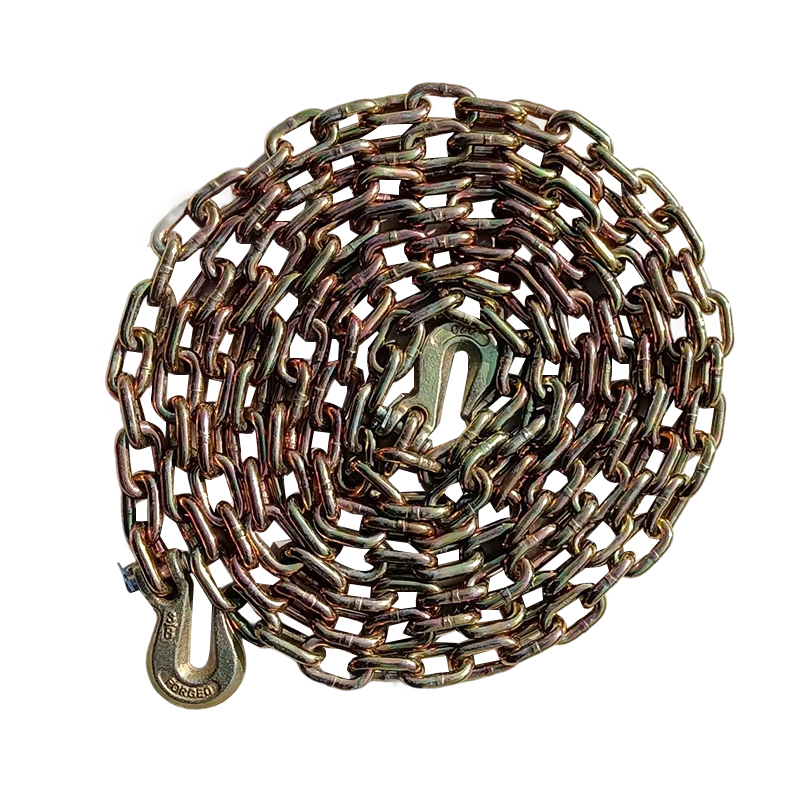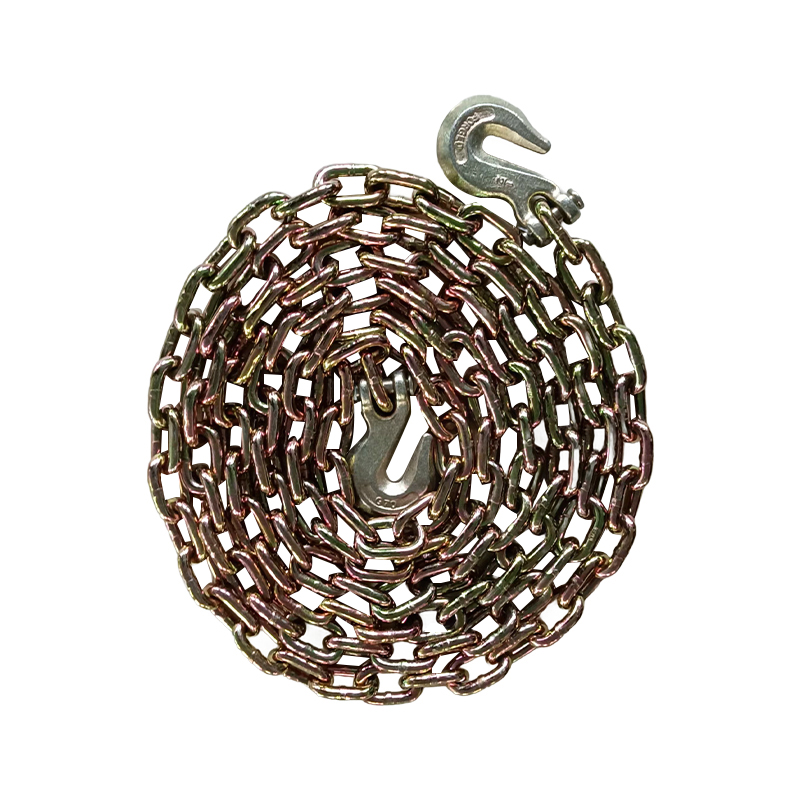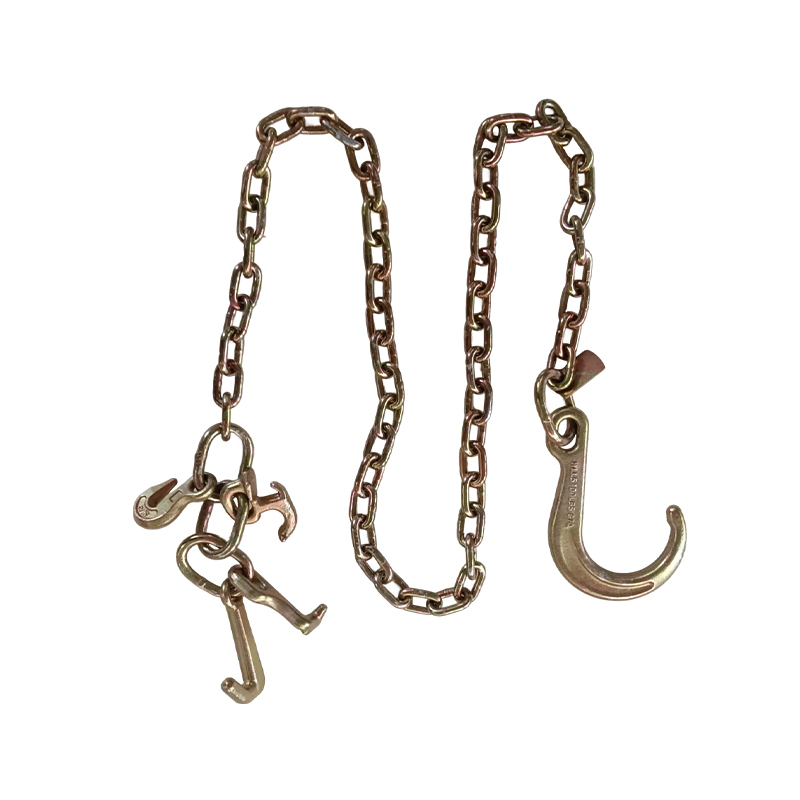What is the key role of high-strength alloy steel in improving the tensile strength and fatigue life of trailer chains?
Release Time : 2025-08-14
Across the vast landscape of modern transportation and heavy-duty operations, the trailer chain, though seemingly mundane, is a crucial link between safety and efficiency. It's not just a transmitter of traction; it's the metal backbone that carries trust. From car rescues on winding mountain roads, to agricultural machinery tethered across vast fields, to industrial transport within busy factory areas, the trailer chain, with its unyielding quality, silently ensures smooth and secure movement. Today, with advances in materials science and manufacturing processes, the trailer chain has transcended the rugged image of traditional iron chains, evolving into a modern engineering masterpiece that combines high strength, corrosion resistance, ease of operation, and an industrial aesthetic.
At first glance, this trailer chain exudes a calm and refined sense of power. Each link is precision forged and heat-treated, resulting in distinct contours, smooth curves, and a uniform matte metallic finish that is both slip-resistant and fingerprint-resistant. Unlike the crudely welded chains of earlier generations, modern trailer chains utilize integrated molding or high-frequency welding technology, ensuring extremely high tensile strength and fatigue life at every connection point. Some high-end models are also treated with galvanizing, nickel plating, or epoxy coating, creating a dense protective layer that effectively resists rain, salt spray, mud, and even chemical corrosion. Even after prolonged exposure to humid, coastal, or industrially polluted environments, they maintain structural integrity and a lustrous finish, showcasing exceptional durability.
The core value of trailer chains lies in the multiple innovations behind their reliability. Trailer chains are primarily constructed from high-quality alloy steels, such as manganese steel or chrome-molybdenum steel, offering exceptional yield strength and toughness, capable of withstanding traction loads of several or even tens of tons without plastic deformation. Even under extreme tensile and impact loads, the chain links maintain stable engagement, preventing breakage or disengagement. This high strength not only enhances transportation safety but also extends product life, reducing replacement frequency and maintenance costs. A high-performance trailer chain is particularly crucial for high-risk operations such as off-road rescue and heavy equipment handling.
Even more commendable is its user-friendly design. The sturdy connectors at each end of the chain are no longer simple cotter pins or threaded buckles. Instead, they feature spring locks, swivel hooks, or quick-release mechanisms, enabling one-handed installation and removal, greatly enhancing ease of use. The connectors often feature anti-slip grooves and safety warning labels, enhancing grip stability while also reminding users to operate properly. Some intelligent trailer chains even have built-in stress-sensing modules that wirelessly indicate the current load status, preventing overload risks and upgrading passive protection to active warnings.
The trailer chain's adaptability is extremely broad in scope. In vehicle recovery, it serves as a rigid alternative to towing ropes, suitable for use in complex terrain and towing heavy loads. In agricultural machinery operations, it connects tractors and implements, enduring frequent starts and stops and vibrations. At ports, mines, and construction sites, it handles the short-distance transport of heavy materials. No matter how harsh the environment—mud, ice, snow, heat, or dust—when used correctly, the trailer chain can reliably perform its vital role, becoming an indispensable and reliable partner in mobile operations.
Environmental protection and sustainability were also considered in the design. The use of high-strength materials reduces the amount of metal required per unit load; the use of recyclable steel reduces resource consumption; and the long-life design reduces the environmental impact of discarded chains. Some manufacturers also offer chain refurbishment services, which revitalize old chains through inspection, repair, and recoating, practicing the concept of a circular economy.
The trailer chain is the crystallization of strength and wisdom. Its simplest metal form embodies the most profound engineering philosophy: maintaining composure under extreme loads and maintaining its integrity despite the erosion of time. It is unassuming, yet demonstrates its value in every traction; it is silent, yet earns trust with its silent tenacity. In today's pursuit of speed and intelligence, the trailer chain, with its pristine and powerful presence, reminds us that true safety often comes from the most solid foundation.
At first glance, this trailer chain exudes a calm and refined sense of power. Each link is precision forged and heat-treated, resulting in distinct contours, smooth curves, and a uniform matte metallic finish that is both slip-resistant and fingerprint-resistant. Unlike the crudely welded chains of earlier generations, modern trailer chains utilize integrated molding or high-frequency welding technology, ensuring extremely high tensile strength and fatigue life at every connection point. Some high-end models are also treated with galvanizing, nickel plating, or epoxy coating, creating a dense protective layer that effectively resists rain, salt spray, mud, and even chemical corrosion. Even after prolonged exposure to humid, coastal, or industrially polluted environments, they maintain structural integrity and a lustrous finish, showcasing exceptional durability.
The core value of trailer chains lies in the multiple innovations behind their reliability. Trailer chains are primarily constructed from high-quality alloy steels, such as manganese steel or chrome-molybdenum steel, offering exceptional yield strength and toughness, capable of withstanding traction loads of several or even tens of tons without plastic deformation. Even under extreme tensile and impact loads, the chain links maintain stable engagement, preventing breakage or disengagement. This high strength not only enhances transportation safety but also extends product life, reducing replacement frequency and maintenance costs. A high-performance trailer chain is particularly crucial for high-risk operations such as off-road rescue and heavy equipment handling.
Even more commendable is its user-friendly design. The sturdy connectors at each end of the chain are no longer simple cotter pins or threaded buckles. Instead, they feature spring locks, swivel hooks, or quick-release mechanisms, enabling one-handed installation and removal, greatly enhancing ease of use. The connectors often feature anti-slip grooves and safety warning labels, enhancing grip stability while also reminding users to operate properly. Some intelligent trailer chains even have built-in stress-sensing modules that wirelessly indicate the current load status, preventing overload risks and upgrading passive protection to active warnings.
The trailer chain's adaptability is extremely broad in scope. In vehicle recovery, it serves as a rigid alternative to towing ropes, suitable for use in complex terrain and towing heavy loads. In agricultural machinery operations, it connects tractors and implements, enduring frequent starts and stops and vibrations. At ports, mines, and construction sites, it handles the short-distance transport of heavy materials. No matter how harsh the environment—mud, ice, snow, heat, or dust—when used correctly, the trailer chain can reliably perform its vital role, becoming an indispensable and reliable partner in mobile operations.
Environmental protection and sustainability were also considered in the design. The use of high-strength materials reduces the amount of metal required per unit load; the use of recyclable steel reduces resource consumption; and the long-life design reduces the environmental impact of discarded chains. Some manufacturers also offer chain refurbishment services, which revitalize old chains through inspection, repair, and recoating, practicing the concept of a circular economy.
The trailer chain is the crystallization of strength and wisdom. Its simplest metal form embodies the most profound engineering philosophy: maintaining composure under extreme loads and maintaining its integrity despite the erosion of time. It is unassuming, yet demonstrates its value in every traction; it is silent, yet earns trust with its silent tenacity. In today's pursuit of speed and intelligence, the trailer chain, with its pristine and powerful presence, reminds us that true safety often comes from the most solid foundation.







